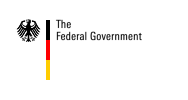The group of the seven leading industrial nations plus Russia, the G8, do not aim to pursue their own special agendas, stressed the Chancellor, speaking in the German parliament. Their goal is to identify solutions to the greatest challenges facing the whole of humanity. More than ever before these include security, environmental and development policy issues.
Globalisation can and must be shaped
"Globalisation offers huge opportunities for all countries to grow and prosper," said Merkel. "We must, however, recognise these opportunities and grasp them."
Germany, with eight million jobs dependent on exports, can benefit from free world trade every bit as much as developing countries and emerging economies. But, the process of globalisation must be shaped jointly at international political level. "The G8 is a valuable body in this regard," underlined Merkel. In spite of popular misconceptions, globalisation has in no way turned politicians into paper tigers.
Strengthening the social dimensions
The Chancellor expressed her understanding of the fact that continued globalisation is feared by many. "The German government takes these concerns seriously," she assured listeners. And questions such as how Europe can hold its own against international competitors and preserve its standards and its prosperity cannot simply be swept under the carpet.
 Photo: REGIERUNGonline / Steins
Photo: REGIERUNGonline / Steins
The Chancellor thanked Vice-Chancellor Franz Müntefering, who has prepared this topic for the Summit with unswerving commitment. On his initiative, the ministers of labour and employment of the G8 nations met for the first time during the German Presidency. Along with international experts, they discussed social and equitable globalisation in Dresden.
Open markets, clear regulations
The Chancellor sees one promising approach to ensuring the future of European business and industry in the three-pronged approach that has already proved its worth in Germany - overhaul, reform and invest. Open markets should encourage trade among all nations – and thus foster growth.
To ensure that free trade is also fair and that it operates smoothly, even free markets need some regulation, according to the Chancellor. International financial markets must become more transparent, for instance. As the acting G8 President, Merkel thus welcomed the recent decision of G8 ministers of finance to recommend standards for hedge funds.
The protection of intellectual property rights too should become more effective at international level. The G8 states will be discussing this in Heiligendamm, in particular with emerging economies such as China and India.
Climate protection: Industrial countries must lead the way
In the field of climate protection, Merkel is convinced that the industrialised countries must act as trailblazers. Only then will the less developed economies follow. "Otherwise we have no chance of combating climate change," declared the Chancellor.
With respect to energy efficiency, in particular, technological cooperation with emerging economies must be stepped up.
Development aid: The G8 nations will keep their word
With a view to the development-policy goals agreed two years ago in Gleneagles, Merkel stated, "We will deliver on our pledges". At the G8 Summit in Scotland the heads of state and government agreed to top up their development aid to 50 billion dollars a year by 2010.
In order to achieve this goal, the Chancellor plans to break new ground. She can quite happily visualise supporting development-policy projects with the cash generated by auctioning off CO2 emission reduction certificates. This too will be discussed in Heiligendamm.
The continued reform partnership with Africa aims to achieve a stable world order and is thus in the best interests of the industrial states, Merkel reminded her audience. She is calmly confident that this partnership will bear fruit.
"Africa is moving forward," declared the Chancellor. "More and more states are becoming democratic. Economic growth is gaining momentum. The number of armed conflicts is dropping." However, she pointed out, there is still a lot to be done. This is reflected in the worrying developments in Zimbabwe and Darfur, for instance, but also in irregularities in the elections in Nigeria.
Peaceful protestors will be listened to
Angela Merkel is convinced that globalisation can be shaped at political level. She promised to keep open the lines of communication between the G8 and those who doubt this. "Peaceful protestors have legitimate concerns," said Merkel, referring to the demonstrations planned by anti-globalisation groups, "and we will listen to their points of view".
Merkel summed up the agenda for the Summit with the slogan, "Growth and Responsibility".

